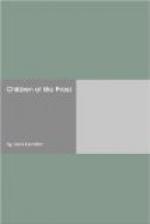Howkan shook his head with impatience. “Have I not told thee it be there in the paper, O fool?”
Imber stared hard at the ink-scrawled surface. “As the hunter looks upon the snow and says, Here but yesterday there passed a rabbit; and here by the willow scrub it stood and listened, and heard, and was afraid; and here it turned upon its trail; and here it went with great swiftness, leaping wide; and here, with greater swiftness and wider leapings, came a lynx; and here, where the claws cut deep into the snow, the lynx made a very great leap; and here it struck, with the rabbit under and rolling belly up; and here leads off the trail of the lynx alone, and there is no more rabbit,—as the hunter looks upon the markings of the snow and says thus and so and here, dost thou, too, look upon the paper and say thus and so and here be the things old Imber hath done?”
“Even so,” said Howkan. “And now do thou listen, and keep thy woman’s tongue between thy teeth till thou art called upon for speech.”
Thereafter, and for a long time, Howkan read to him the confession, and Imber remained musing and silent At the end, he said:
“It be my talk, and true talk, but I am grown old, Howkan, and forgotten things come back to me which were well for the head man there to know. First, there was the man who came over the Ice Mountains, with cunning traps made of iron, who sought the beaver of the Whitefish. Him I slew. And there were three men seeking gold on the Whitefish long ago. Them also I slew, and left them to the wolverines. And at the Five Fingers there was a man with a raft and much meat.”
At the moments when Imber paused to remember, Howkan translated and a clerk reduced to writing. The courtroom listened stolidly to each unadorned little tragedy, till Imber told of a red-haired man whose eyes were crossed and whom he had killed with a remarkably long shot.
“Hell,” said a man in the forefront of the onlookers. He said it soulfully and sorrowfully. He was red-haired. “Hell,” he repeated. “That was my brother Bill.” And at regular intervals throughout the session, his solemn “Hell” was heard in the courtroom; nor did his comrades check him, nor did the man at the table rap him to order.
Imber’s head drooped once more, and his eyes went dull, as though a film rose up and covered them from the world. And he dreamed as only age can dream upon the colossal futility of youth.
Later, Howkan roused him again, saying: “Stand up, O Imber. It be commanded that thou tellest why you did these troubles, and slew these people, and at the end journeyed here seeking the Law.”
Imber rose feebly to his feet and swayed back and forth. He began to speak in a low and faintly rumbling voice, but Howkan interrupted him.
“This old man, he is damn crazy,” he said in English to the square-browed man. “His talk is foolish and like that of a child.”




